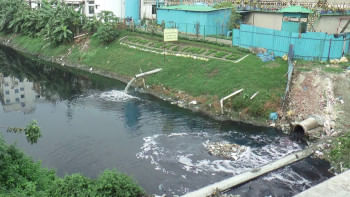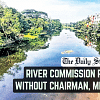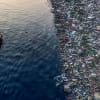Spare our rivers from certain death

Recently, a minister commented that rivers in Bangladesh were too wide. He went on to say that we don't need such wide rivers, and that we have to narrow them down and recover land from the riverbanks to build resorts and roads and implement other forms of development.
Initially, I thought it was one of those times when our ministers make irresponsible statements. But as it turned out, these were not mere comments.
For years, big projects have been planned around rivers with the aim to improve the rivers' navigability and waterflow by shrinking them. According to the latest media report, the Jamuna River will be narrowed at the estimated cost of more than Tk 1,000 crore, of which more than Tk 800 crore will be provided by the World Bank as a loan.
There are a lot of aspects of this project: there will be studies, visits to foreign countries, workshops, seminars, and construction. A lot of interests are attached to this project, so this is great news for many of the stakeholders involved. This is not the first time this is happening either; there is also another project around the Brahmaputra River, also being funded by the World Bank.
We are currently deprived of water in the Teesta River, and there is no news of progress in signing the Teesta water-sharing deal. As the situation stands right now, there are numerous obstacles being built on the Teesta's upstream in India. In fact, the government of the state of West Bengal is planning to dig canals to divert water from the river. On the Bangladesh side, the Teesta already suffers from low water flow during the dry season; add on top of that all the obstacles like the Gajoldoba Barrage, and now this latest plan in West Bengal, and this waterflow will diminish further.
People who live along the banks of the Teesta in northern Bangladesh are suffering because of this, and they also suffer when the water flow suddenly increases during monsoon, when India opens the barrage. With the Teesta not in a good shape, this increased torrent of water overflows its banks and causes floods in that region. There seems to be no initiative to solve this problem, and discussions on this topic are at a standstill.
The chief minister of West Bengal is being blamed for this situation, but in reality there is nothing that India's central government can't do when it comes to foreign relations. The central government doesn't always do things that make Mamata Banerjee happy. Thus, the argument that the Teesta water-sharing agreement is not moving forward because of Mamata Banerjee is not acceptable.
Those who care even slightly about the rights of Bangladeshi people, the existence of Bangladesh, and the future of our country, must oppose the development projects that are detrimental to our rivers, the aggression towards the rivers and the encroachment of the rivers.
Many initiatives and discussions could have been undertaken on this issue; there could have been multilateral meetings, if not bilateral, but nothing of the sort has been done. Instead, a megaproject has been planned with China's involvement where the Teesta's banks will be pulled in to make it narrower, the river will be dredged, and resorts will be built on the land that's recovered. There is a craze surrounding resorts all of a sudden – that they need to be built so people can visit them and generate tourism. And for that, rivers need to be narrowed down.
There are plans with the Meghna and the Brahmaputra as well. Some of them are in partnership with India, and the World Bank and the Asian Development Bank (ADB) are involved, too. Many Bangladeshi water resource experts are also involved with these. Most importantly, the organisation that is responsible for ensuring waterflow through the rivers in Bangladesh, that is responsible for looking after the health of our rivers and for taking the necessary steps against river erosion – the Bangladesh Water Development Board – is the one undertaking these projects.
Rivers aren't separate from our collective existence; rivers are connected to the existence of Bangladesh itself. If Bangladesh has an important strategic resource, it has to be our water. Our agriculture, livelihood, soil fertility, biodiversity are all dependent on our rivers. And these rivers are now under attack.
These attacks are coming from three directions. The first kind is coming from India with its barrages and river connection projects. The second is Bangladesh's own projects that are being undertaken in the name of development. Some projects are filling up the riverbeds, some are disrupting the waterflow with sluice gates, and some projects are impeding the rivers' free flow of water with construction along the banks. Coal-based projects and other similar undertakings are polluting the rivers as well.
The third kind is coming from powerful individuals in Bangladesh – those who are close to power. They are encroaching on the rivers, turning them into drains by polluting them. If one travelled around Bangladesh today, they'd come upon many bridges across rivers that have no water in them.
In the late 1980s, a Flood Action Plan (FAP) was introduced, in partnership with the World Bank. The plan was to create 4,000km of walls and dams along the Padma, the Meghna, and the Brahmaputra to control the waterflow. It's difficult to understand the level of scientific and intellectual thought that led to this plan. The driving force behind it seemed to have been that the bigger the plans are, the more economic opportunity is created for those involved, such as construction companies, engineers, economists, consultants, experts, firms affiliated with the organisations that provide loans, etc.
The authorities were unable to implement the FAP because there were protests at that time. But they've been doing the same thing under different names since. Right now, the Delta Plan that is being implemented is somewhat similar.
The condition our rivers are in right now is a threat to our existence. The government has a simple way to resolve the river dispute with India. In 1997, an international water convention was held by the United Nations. The convention clearly states what rights are held by the countries upstream and downstream. Bangladesh has not yet ratified this convention – neither has India. It makes sense for India to not ratify it as they are an upstream country, but Bangladesh needs to ratify the convention quickly. After doing that, Bangladesh can bring this issue to the international community. This is an easy way to ensure waterflow of the Teesta, the Meghna, the Jamuna, the Brahmaputra, and all other shared rivers, especially as bilateral discussions with India have not led to an agreement in many years. The fact that the government hasn't ratified the UN convention yet is a big problem.
Looking within the country, development projects have a dangerous aspect as they are destructive to our rivers. These are the projects that will narrow rivers down as they progress. This may increase our GDP, by filling up rivers, building resorts and growing tourism. But when a river's natural course is interfered with, the river will die. Many rivers have already been murdered like this.
Our rivers need to be at the forefront of all economic, political, and social discussions. Those who care even slightly about the rights of Bangladeshi people, the existence of Bangladesh, and the future of our country, must oppose the development projects that are detrimental to our rivers, the aggression towards the rivers and the encroachment of the rivers. On the one hand, we see the High Court ruling that rivers are living entities, and on the other hand, we see repeated attacks on these living entities. Thus, voices should be raised and discussions ought to be had on this issue from all quarters. We must also raise our voice against those experts who are involved in such destructive initiatives and are giving them credibility.
Transcribed and translated by Azmin Azran.
Anu Muhammad is a professor of economics at Jahangirnagar University.

 For all latest news, follow The Daily Star's Google News channel.
For all latest news, follow The Daily Star's Google News channel. 










Comments